I decided last year that I would try to avoid flying as a travel writer. I didn’t want to be encouraging readers — directly or indirectly — to burn more oil at a time when we should all be burning less. In acknowledgement of the cumulative depth of my carbon footprint, I promised not to fly at all in 2020, and signed up to Flight Free UK. When I did that, I didn’t expect that I would soon find myself being discouraged from taking trains and ships as well.
I’m still travelling, though. I’ve recently been to Istanbul and the Balkans, to the Ukraine and St Petersburg, and even as far as the Black Hills of South Dakota. All thanks to what DH Lawrence, in Mornings in Mexico, summed up as “one little individual, looking at a bit of sky and trees, then… making little marks on paper”.
The body hasn’t been crossing oceans, but the mind has been roaming where it will, and a few hundred pages between covers have taken it an awfully long way. If you’ve had to abandon your travel plans or, worse still, lock yourself away, the books below will help you break free. And if you’re going to buy one, please do it through an independent bookshop and not an online giant that doesn’t really need the trade.
Skyfaring: A Journey with a Pilot by Mark Vanhoenacker (Vintage)
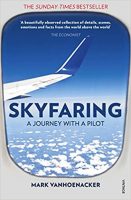 “I’m grounded,” you’re thinking. “I don’t want to read aviation’s equivalent of a petrolhead.” And you won’t. In his hymn to “the business of guiding vessels between blue-parted cities”, Vanhoenacker touches on Joni Mitchell as well as Mach 1, on T S Eliot as well as tailwinds. In the pages of his book, if not necessarily on your next outing in the economy cabin of his 747, you will find yourself agreeing that “The ordinary things we thought we knew… become more beautiful.”
“I’m grounded,” you’re thinking. “I don’t want to read aviation’s equivalent of a petrolhead.” And you won’t. In his hymn to “the business of guiding vessels between blue-parted cities”, Vanhoenacker touches on Joni Mitchell as well as Mach 1, on T S Eliot as well as tailwinds. In the pages of his book, if not necessarily on your next outing in the economy cabin of his 747, you will find yourself agreeing that “The ordinary things we thought we knew… become more beautiful.”
Old Glory: An American Voyage by Jonathan Raban (Eland)
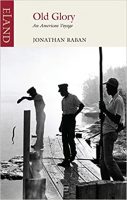 Wishing you were out on the water? Jonathan Raban is better equipped than any living writer I know to take you there. Reading Huckleberry Finn at seven, he dreamt the brook at the end of his Norfolk street into the wide waterway of the Mississippi. Thirty years later, he followed the river for most of its length in a 16ft aluminium skiff, all the while illuminating the America and Americans of the late 1970s.
Wishing you were out on the water? Jonathan Raban is better equipped than any living writer I know to take you there. Reading Huckleberry Finn at seven, he dreamt the brook at the end of his Norfolk street into the wide waterway of the Mississippi. Thirty years later, he followed the river for most of its length in a 16ft aluminium skiff, all the while illuminating the America and Americans of the late 1970s.
Lands of Lost Borders by Kate Harris (HarperCollins)
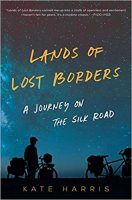 Harris, an academic high-flyer from Canada, had ambitions to be an astronaut, then decided there was exploring enough to be done on planet Earth. Cycling the Silk Road with a childhood friend, she pedals to places where authorities don’t want her to go, including Tibet. On the page, she flits easily across supposed boundaries between travelogue and memoir, science and poetry. The result is a marvellous debut by a wanderer and wonderer, an author with boundless curiosity and a zest for life that enthuses every page.
Harris, an academic high-flyer from Canada, had ambitions to be an astronaut, then decided there was exploring enough to be done on planet Earth. Cycling the Silk Road with a childhood friend, she pedals to places where authorities don’t want her to go, including Tibet. On the page, she flits easily across supposed boundaries between travelogue and memoir, science and poetry. The result is a marvellous debut by a wanderer and wonderer, an author with boundless curiosity and a zest for life that enthuses every page.
The Old Ways by Robert Macfarlane (Penguin)
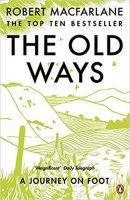 Macfarlane’s Underland was recently named Stanford Dolman Travel Book of the Year, but tunnels may not be what you’re looking for right now. Join him, instead, in some leg-stretching, mind-expanding hikes on The Old Ways. Inspired by the poet Edward Thomas, “who thought on paths and of them, but also with them”, Macfarlane walks ancient routes everywhere from the chalk downs of England to the bird islands of north-west Scotland; from the disputed territories of Palestine to the sacred landscapes of Spain and the Himalayas.
Macfarlane’s Underland was recently named Stanford Dolman Travel Book of the Year, but tunnels may not be what you’re looking for right now. Join him, instead, in some leg-stretching, mind-expanding hikes on The Old Ways. Inspired by the poet Edward Thomas, “who thought on paths and of them, but also with them”, Macfarlane walks ancient routes everywhere from the chalk downs of England to the bird islands of north-west Scotland; from the disputed territories of Palestine to the sacred landscapes of Spain and the Himalayas.
Venice by Jan Morris (Faber & Faber)
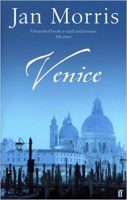 Jan Morris avoids the label travel writer, on the basis that she doesn’t go on journeys, but she is one of the greatest conjurors of place. She published this portrait of the city in 1960, and though it has gone into numerous editions it has never really been revised. But then it’s not a guidebook; it’s a love letter. Contemporary Venice, she says, is “a grand (and heavily over-booked) exhibition”; let her show you the city as it used to be.
Jan Morris avoids the label travel writer, on the basis that she doesn’t go on journeys, but she is one of the greatest conjurors of place. She published this portrait of the city in 1960, and though it has gone into numerous editions it has never really been revised. But then it’s not a guidebook; it’s a love letter. Contemporary Venice, she says, is “a grand (and heavily over-booked) exhibition”; let her show you the city as it used to be.
As I Walked Out One Midsummer Morning by Laurie Lee (Penguin)
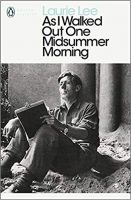 Hankering for the heat that comes earlier in Spain? Then join Lee on his journey there in the 1930s. He wasn’t a trust-fund tourist; he paid his way with busking and labouring, sailing for Vigo with a knapsack, a fiddle and enough Spanish to ask for water: “I didn’t bother to wonder what would happen then, for already I saw myself there, brown as an apostle, walking the white dust roads through the orange groves.”
Hankering for the heat that comes earlier in Spain? Then join Lee on his journey there in the 1930s. He wasn’t a trust-fund tourist; he paid his way with busking and labouring, sailing for Vigo with a knapsack, a fiddle and enough Spanish to ask for water: “I didn’t bother to wonder what would happen then, for already I saw myself there, brown as an apostle, walking the white dust roads through the orange groves.”
Skybound by Rebecca Loncraine (Picador)
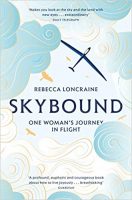 Confinement to avoid Coronavirus is scary enough, but what if you were given a diagnosis of cancer? That’s what Rebecca Loncraine faced in 2009 at the age of 35. She took up gliding, and her “private love letters to the wind” were the beginnings of Skybound, which appeared in 2016, a couple of years after her death. It’s an extraordinary book, one in which the writer, for whom the world had closed down, feels it reopen, and carries the reader up on the thermals with her.
Confinement to avoid Coronavirus is scary enough, but what if you were given a diagnosis of cancer? That’s what Rebecca Loncraine faced in 2009 at the age of 35. She took up gliding, and her “private love letters to the wind” were the beginnings of Skybound, which appeared in 2016, a couple of years after her death. It’s an extraordinary book, one in which the writer, for whom the world had closed down, feels it reopen, and carries the reader up on the thermals with her.
How to Travel Without Seeing by Andrés Neuman (Restless Books)
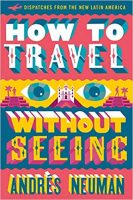 If you’ve had to put a gap-year trip on hold, here’s a chance to take in Latin America in a rush. A tour Neuman was sent on after winning a literary prize had him pinballing from place to place — 19 countries in all — so the writing, he decided, should reflect that; the journal should take on the form of the journey. The result is not so much a travel book as a travelling one: instant, impressionistic, written from a need “to trap small realities on the go and interpret them in real time”.
If you’ve had to put a gap-year trip on hold, here’s a chance to take in Latin America in a rush. A tour Neuman was sent on after winning a literary prize had him pinballing from place to place — 19 countries in all — so the writing, he decided, should reflect that; the journal should take on the form of the journey. The result is not so much a travel book as a travelling one: instant, impressionistic, written from a need “to trap small realities on the go and interpret them in real time”.
Chesapeake Requiem by Earl Swift (Dey Street)
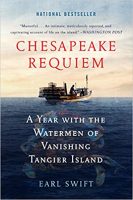 A health emergency has, for the moment, drawn attention away from the climate emergency. One spot where the latter is evident (at least to outsiders) is Tangier Island in the Chesapeake Bay, where a 240-year-old crabbing community is going under the water. Swift lived among the islanders, and his book, at once affectionate and inquiring, is a superb account of a singular place and its people.
A health emergency has, for the moment, drawn attention away from the climate emergency. One spot where the latter is evident (at least to outsiders) is Tangier Island in the Chesapeake Bay, where a 240-year-old crabbing community is going under the water. Swift lived among the islanders, and his book, at once affectionate and inquiring, is a superb account of a singular place and its people.
The Worst Journey in the World by Apsley Cherry-Garrard (Vintage Classics)
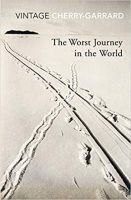 Sometimes, just sometimes, you need a travel book that will make you count your blessings to be stuck at home. This one should do it. The journey was Scott’s last expedition to the Antarctic — beaten to the Pole by Amundsen’s — and Cherry-Garrard was one of its members. His account, of freezing, soaking, blubber-eating hardship, is written with unfailing good humour. “Polar exploration,” he declares at the outset, “is at once the cleanest and most isolated way of having a bad time which has been devised.”
Sometimes, just sometimes, you need a travel book that will make you count your blessings to be stuck at home. This one should do it. The journey was Scott’s last expedition to the Antarctic — beaten to the Pole by Amundsen’s — and Cherry-Garrard was one of its members. His account, of freezing, soaking, blubber-eating hardship, is written with unfailing good humour. “Polar exploration,” he declares at the outset, “is at once the cleanest and most isolated way of having a bad time which has been devised.”

Leave a Reply